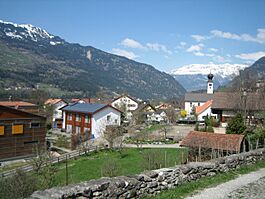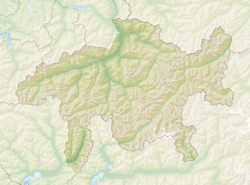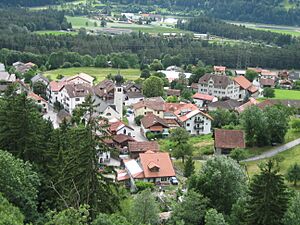Rodels facts for kids
Quick facts for kids
Rodels
|
||
|---|---|---|
 |
||
|
||
| Country | Switzerland | |
| Canton | Graubünden | |
| District | Hinterrhein | |
| Area | ||
| • Total | 1.68 km2 (0.65 sq mi) | |
| Elevation | 684 m (2,244 ft) | |
| Population
(Dec 2013)
|
||
| • Total | 267 | |
| • Density | 158.9/km2 (411.6/sq mi) | |
| Postal code |
7415
|
|
| Surrounded by | Almens, Cazis, Paspels, Pratval | |
Rodels (which is called Roten in Romansh) was once a small town, or municipality, in the canton of Graubünden in Switzerland. It was part of the Hinterrhein district. On January 1, 2015, Rodels joined with a few other nearby towns. These towns were Almens, Paspels, Pratval, and Tomils. Together, they formed a new, bigger municipality called Domleschg.
Contents
History of Rodels
Rodels was first written about in the middle of the 12th century. Back then, it was known by the name ad Rautine.
Geography and Landscape
Before it joined with other towns, Rodels covered an area of about 1.7 square kilometers (0.65 square miles). A big part of this land, about 52.4%, was used for farming. Forests covered another 31.5% of the area.
About 11.3% of the land had buildings or roads on it. The remaining 4.8% was made up of things like rivers or mountains that couldn't be used for building or farming.
Rodels was located in a part of the Hinterrhein district called Domleschg. It had a special kind of village layout. One part was a linear village, meaning houses were built mostly along a road. Another part was a haufendorf, which is an unplanned village with houses packed closely around a central area. There was also a tiny village, or hamlet, called Nueins. The town was built on a low, flat area next to the Hinterrhein river.
People and Population
In 2013, Rodels had a population of 267 people. About 7.9% of these people were from other countries. The number of people living in Rodels stayed about the same between 2000 and 2010. However, from 2010 to 2013, the population went down by 5%.
In 2000, there were slightly more males (50.8%) than females (49.2%) in Rodels. The town had people of all ages, from young children to very old adults.
In the 2011 federal election, people in Rodels voted for different political groups. The most popular group was the SVP, which got 23.6% of the votes. Other popular groups included the BDP (22.1%), the SPS (17.8%), and the CVP (15.5%).
Many adults in Rodels (about 80% of those aged 25-64) had completed upper secondary education or even higher education, like university.
In 2011, the unemployment rate in Rodels was very low, at 1.05%. This means almost everyone who wanted a job had one. In 2008, 20 people worked in farming (the primary sector). Six people worked in manufacturing (the secondary sector). And 23 people worked in services, like shops or offices (the tertiary sector).
Here's how the population of Rodels changed over time:
| Year | Population |
|---|---|
| 1803 | 106 |
| 1850 | 135 |
| 1900 | 147 |
| 1950 | 178 |
| 1980 | 155 |
| 2000 | 281 |
Languages Spoken
Most people in Rodels speak German. In 2000, about 90.7% of the population spoke German. The second most common language was Romansh (3.9%), and the third was Italian (1.8%).
This table shows how many people spoke each language in different years:
| Languages | Census 1980 | Census 1990 | Census 2000 | |||
|---|---|---|---|---|---|---|
| Number | Percent | Number | Percent | Number | Percent | |
| German | 125 | 80.65% | 204 | 91.89% | 255 | 90.75% |
| Romanish | 25 | 16.13% | 10 | 4.50% | 11 | 3.91% |
| Italian | 5 | 3.23% | 5 | 2.25% | 5 | 1.78% |
| Total Population | 155 | 100% | 222 | 100% | 281 | 100% |
Getting Around (Transportation)
The Rhaetian Railway offers train services to a station called Rodels-Realta (Rhaetian Railway station), which is close to Rodels.
See also
 In Spanish: Rodels para niños
In Spanish: Rodels para niños
 | Charles R. Drew |
 | Benjamin Banneker |
 | Jane C. Wright |
 | Roger Arliner Young |





